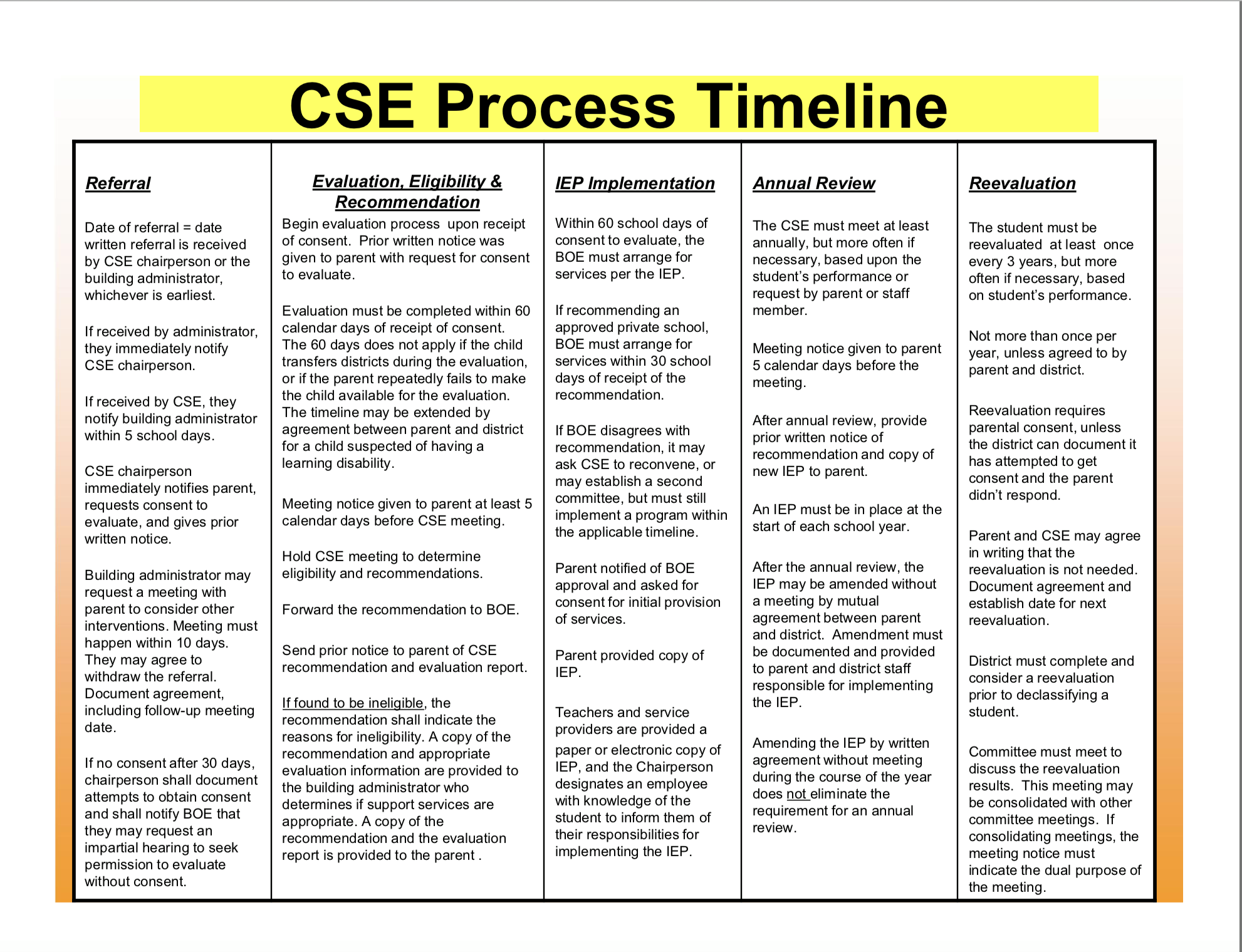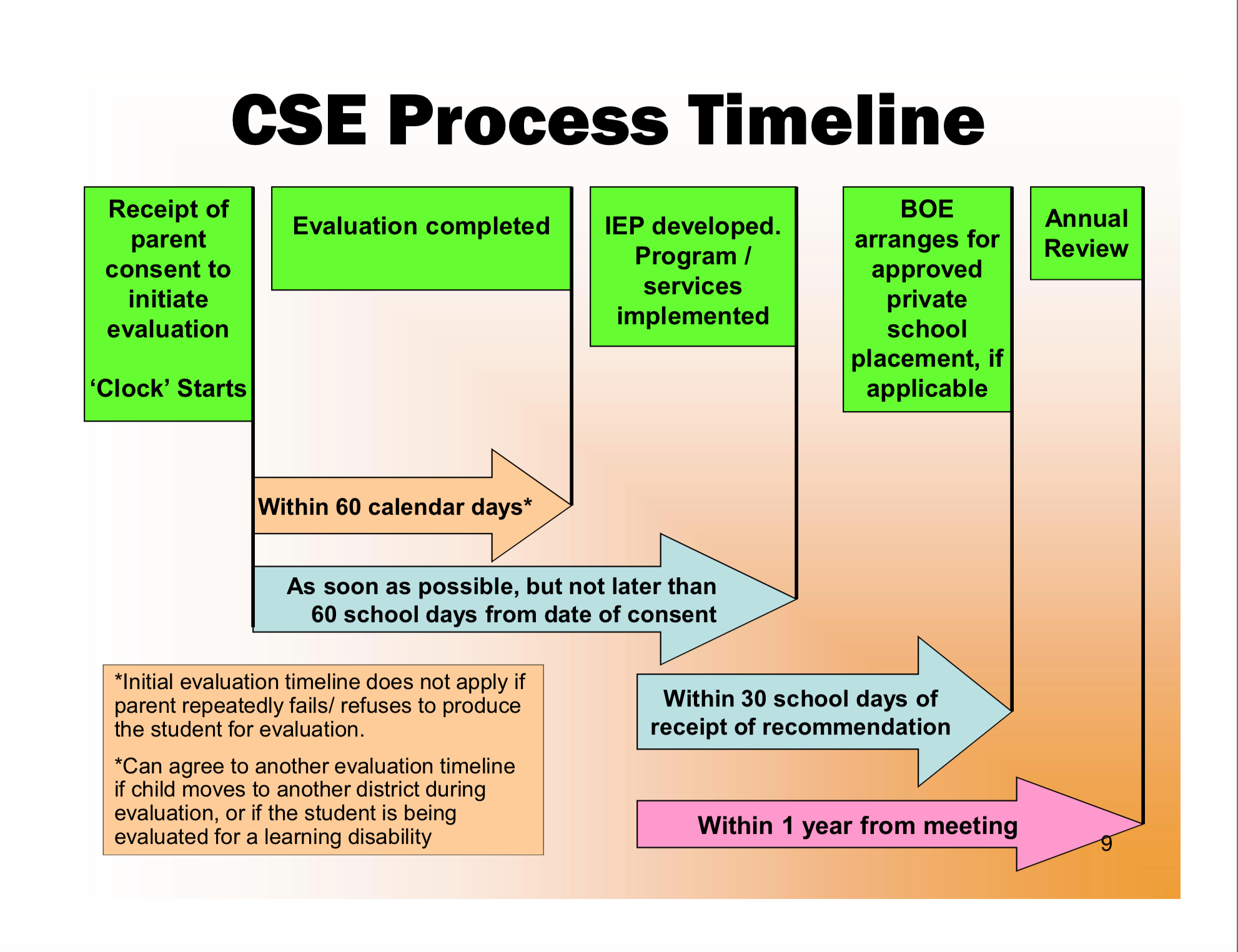KNOW YOUR RIGHTS
"A child with a disability has a federally protected right to special education and related services when he or she needs them to benefit from education. The term "disability" is not limited to physical disability but rather includes mental disability, including mental retardation, serious emotional disturbance, autism, traumatic brain injury, specific learning disabilities, and other health impairments. A parent may request that a child be evaluated by the school district for special education and related services. The law sets forth specific guidelines for the evaluation, assessment, and eligibility determination. Unique to each child, the IEP (Individual Education Plan) is the written plan that documents the child's special education and related services. The initial IEP is developed at a meeting among parents, various school personnel, and others whom the parents may wish to invite. Parents are an integral part of the team and are involved in all decisions by the team. The IEP must be reviewed annually, with attention given to whether educational objectives have been met. For a child with mental health issues, the IEP likely contains "related services," such as counseling, and measurable goals to improve behaviors in the school setting. When a child's condition is such that he or she cannot benefit from education in the regular school setting, other placements are considered. The school district maintains the ultimate responsibility of the cost of all such education placements, including residential care." - US National Library of Medicine National Institutes of Health
Click here for more information regarding Free Appropriate Public Education (FAPE) for Students With Disabilities: Requirements Under Section 504 of The Rehabilitation Act of 1973
GUIDANCE ON FAPE guidance-on-fape-11-17-2015
School Evaluations: Should schools provide parents with a copy before an IEP meeting?
6 Principles of Special Education
We would like to bring your attention to this letter issued from the United States Department of Eduction Office of Special Education and Rehabilitative Services
...To help make certain that children with disabilities are held to high expectations and have meaningful access to a State's academic content standards, we write to clarify that an individualized education program (IEP) for an eligible child with a disability under the Individuals with Disabilities Education Act (IDEA) must be aligned with the State's academic content standards for the grade in which the child is enrolled...(To view the letter in full, click here.)
January 2016 SPECIAL EDUCATION FIELD ADVISORY
FROM: James P. DeLorenzo
SUBJECT: Amendment to Regulations regarding Graduation Requirements to Extend the Appeal Process to include Appeal of Scores for the Safety Net Local Diploma for Students with Disabilities (Effective December 30, 2015)
At their December 2015 meeting, the Board of Regents approved for permanent adoption the amendment of section 100.5(d)(7) of the Regulations of the Commissioner of Education to provide the option for student with disabilities to appeal a score of up to three points below a 55 on up to two Regents exams in order to graduate with a local diploma. (SPED January 16 MEMO REGENTS APPEAL)
October 2015 SPECIAL EDUCATION FIELD ADVISORY
TO: Parents and Educators from Long Island and New York City
FROM: James P. DeLorenzo
SUBJECT: Individualized Education Program (IEP) Facilitation Pilot Program
The New York State Education Department (NYSED), Office of Special Education, is pleased to announce that it has initiated a three-year pilot program of the early dispute resolution option of Individualized Education Program (IEP) Facilitation. Effective immediately, the option of IEP Facilitation is available to schools and parents in school districts in Long Island and in New York City's District 10 in the Bronx and District 24 in Queens. To read the full advisory, click here.
February 2015 SPECIAL EDUCATION FIELD ADVISORY
FROM: James P. DeLorenzo
SUBJECT: 2014 Legislative Changes Affecting Special Education
This memorandum provides information on amendments made to New York State Education Law, pursuant to Chapter 434 of the Laws of 2014, regarding special education parental notification requirements upon a student's entry into school. Section 4402 of the Education Law is amended by adding a new subdivision, effective July 1, 2015, requiring public schools to notify every parent of their rights regarding referral and evaluation of their child for the purposes of special education services or programs upon their child's enrollment in public school.
Attached is information on this change which includes the legal citation(s), a summary of the changes, an effective date, and the corresponding statutory language.
(Statute: Chapter 434 of the Laws of 2014
Upon their child's enrollment or attendance in a public school, such school shall notify every parent or person in parental relation of their rights regarding referral and evaluation of their child for the purposes of special education services or programs pursuant to applicable federal and state laws. Such notification may be provided by directing parents or persons in parental relation to obtain information located on the department's website relating to a parent's guide to special education in New York state for children ages three through twenty-one provided the notification shall also contain the name and contact information for the chairperson of the school district's committee on special education or other individual who is charged with processing referrals to the committee in the district.
June 2014 SPECIAL EDUCATION FIELD ADVISORY
From: James P. DeLorenzo
Subject: The Role of the Committee on Special Education in Relation to the Common Core Learning Standards
The purpose of this memorandum is to reiterate New York State (NYS) policy for the development and implementation of individualized education programs (IEPs) for students with disabilities in consideration of the general education curriculum. There is increased rigor in the learning standards for NYS students. This means that, for all students, teachers are expected to teach and students are expected to learn higher level critical thinking. In order for students with disabilities to meet these high academic standards and demonstrate their knowledge and skills, it is essential that their instruction must incorporate specially designed instruction. to continue click here CSEguidance-June2014
To read Parental consent link 2009 info click here.
To read Section 200.6 Continuum of services click here.
To read the New York State Education Department PROCEDURAL SAFEGUARDS NOTICE April 2014 click here. PSGN-April2014
NYSED GUIDANCE TEST ACCESS AND ACCOMMODATIONS
IMPORTANT WEBSITES AND ADVOCACY INFORMATION
Special Education Quality Assurance (SEQA)
Long Island Regional Office - NYS Education Department P-12: Office of Special Education Perry B. Duryea, Jr. State Office Building Room 2A-5 250 Veterans Memorail Highway Hauppauge, NY 11788 Telephone: (631) 952-3352 -- Fax (631) 952-3834
Special Education Quality Assurance oversees preschool and school-age special education services through a quality assurance review process that emphasizes attainment of positive results for student with disabilities. Regional Associates, located in several quality assurance offices across New York State, coordinate the review process and also provide technical assistance to parents, school district personnel, and private providers. (www.p12.nysed.gov/specialed/quality)
Center for Parent Information and Resources (www.parentcenterhub.org)
Wrightslaw
www.wrightslaw.com Parents, educators, advocates, and attorneys come to Wrightslaw for accurate, reliable information about special education law, education law, and advocacy for children with disabilities.
10 Tips: How to use IDEA 2004 to Improve Education for Children with Disabilities
IDEA
http://idea.ed.gov The Individuals with Disabilities Education Act (IDEA) is a law ensuring services to children with disabilities throughout the nation. IDEA governs how states and public agencies provide early intervention, special education and related services to more than 6.5 million eligible infants, toddlers, children and youth with disabilities.
OPWDD:NYS Office for People With Developmental Disabilities www.opwdd.ny.gov
NEW YORK STATE JUSTICE CENTER FOR THE PROTECTION OF PEOPLE WITH SPECIAL NEEDS
Special Education: Federal vs. State Law | IDEA vs. State Law - Understood
Questions and Answers (Q&A) on U. S. Supreme Court Case Decision Endrew F. v. Douglas County School District Re-1 CLICK HERE qa-endrewcase-12-07-2017
10 Smart Responses for When the School Cuts or Denies Services
ADVOCACY
If you disagree with decisions affecting your child's special education, you have many rights, including the right to mediation and due process.
Reevaluations for Special Education: What You Need to Know
Have an advocacy question? Contact The Long Island Advocacy Center, Inc. http://www.theliac.org. LIAC is a private not-for-profit agency dedicated to protecting the legal rights of students and individuals with disabilities. For assistance in Nassau Telephone: 516.248.2222 Fax: 516.248.2290.
For nonacademic programming such as extracurriculars, athletics, before/after school care, school run summer camps and programs, events put on by the PTA, etc: Districts are required by federal law to provide “necessary accommodations” (such as, but not limited to, an aide) to all disabled students, since all of these activities constitute being a part of the larger school community and students with disabilities would be excluded without appropriate accommodations.
It doesn’t only apply to kids who have an IEP, it applies year round to all students who qualify as disabled under Section 504. You don’t have to qualify for ESY, it doesn’t have to be in your IEP specifically—though putting in wording on the IEP/504 about all necessary accommodations extending to all school community programs and events year round is a good safeguard.
The statutes to cite are section 300.017 and 300.117 under Section 504 of IDEA. This has been the explicit regulation since 2013. It is also a Title II violation of the ADA, which is a civil rights violation. All districts have Title II compliance officers.
This is the federal department of education office of civil rights guidance letter about inclusion on nonacademic programming:
www2.ed.gov/about/offices/list/ocr/letters/colleague-201301-504.pdf
And these are the federal statutes
https://sites.ed.gov/idea/regs/b/b/300.117
https://sites.ed.gov/idea/regs/b/b/300.107
More info and helpful links:
https://www.wrightslaw.com/blog/doe-guidance-on-legal-obligations-for-extracurricular-activities/#comment-2409063
https://www.wrightslaw.com/blog/doe-guidance-on-legal-obligations-for-extracurricular-activities/
https://www.gao.gov/assets/gao-10-519.pdf
https://www.wrightslaw.com/blog/schools-cannot-deny-equal-participation-in-extracurricular-activities/
https://www2.ed.gov/about/offices/list/ocr/docs/dcl-504faq-201109.html
https://www.gao.gov/assets/gao-10-519.pdf




